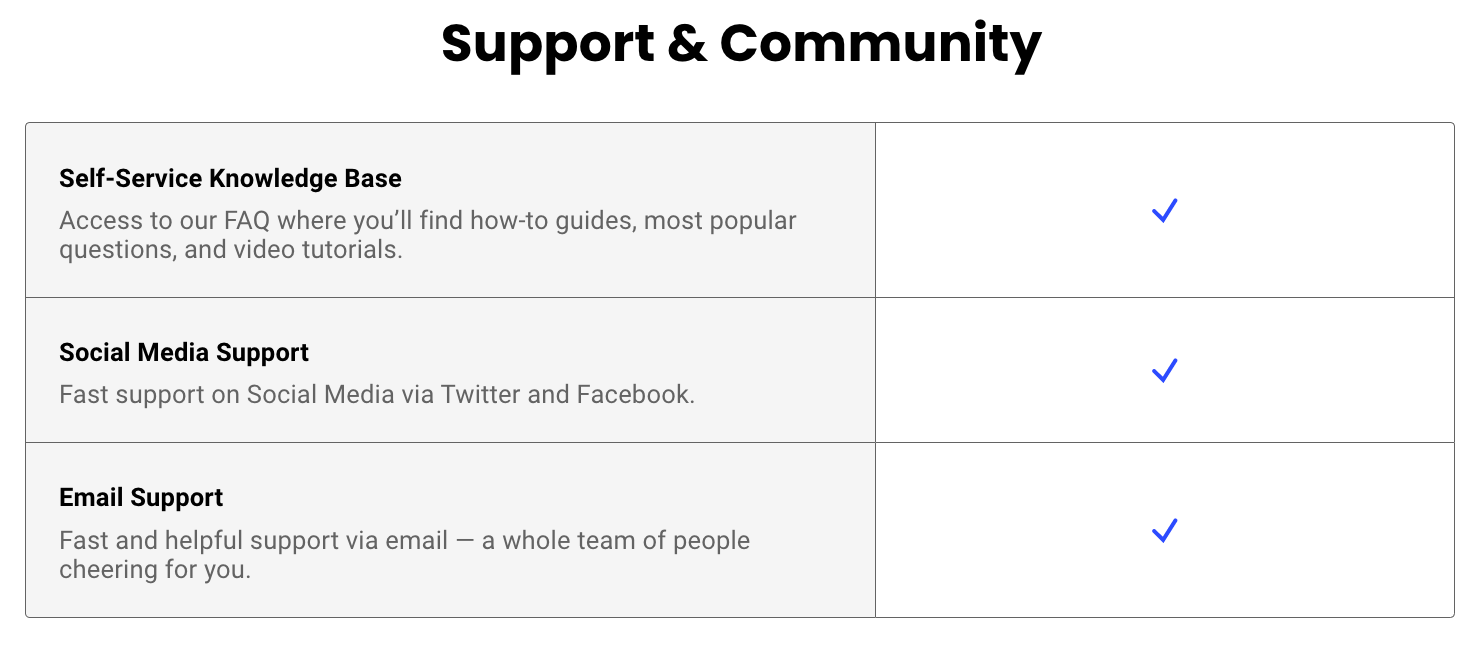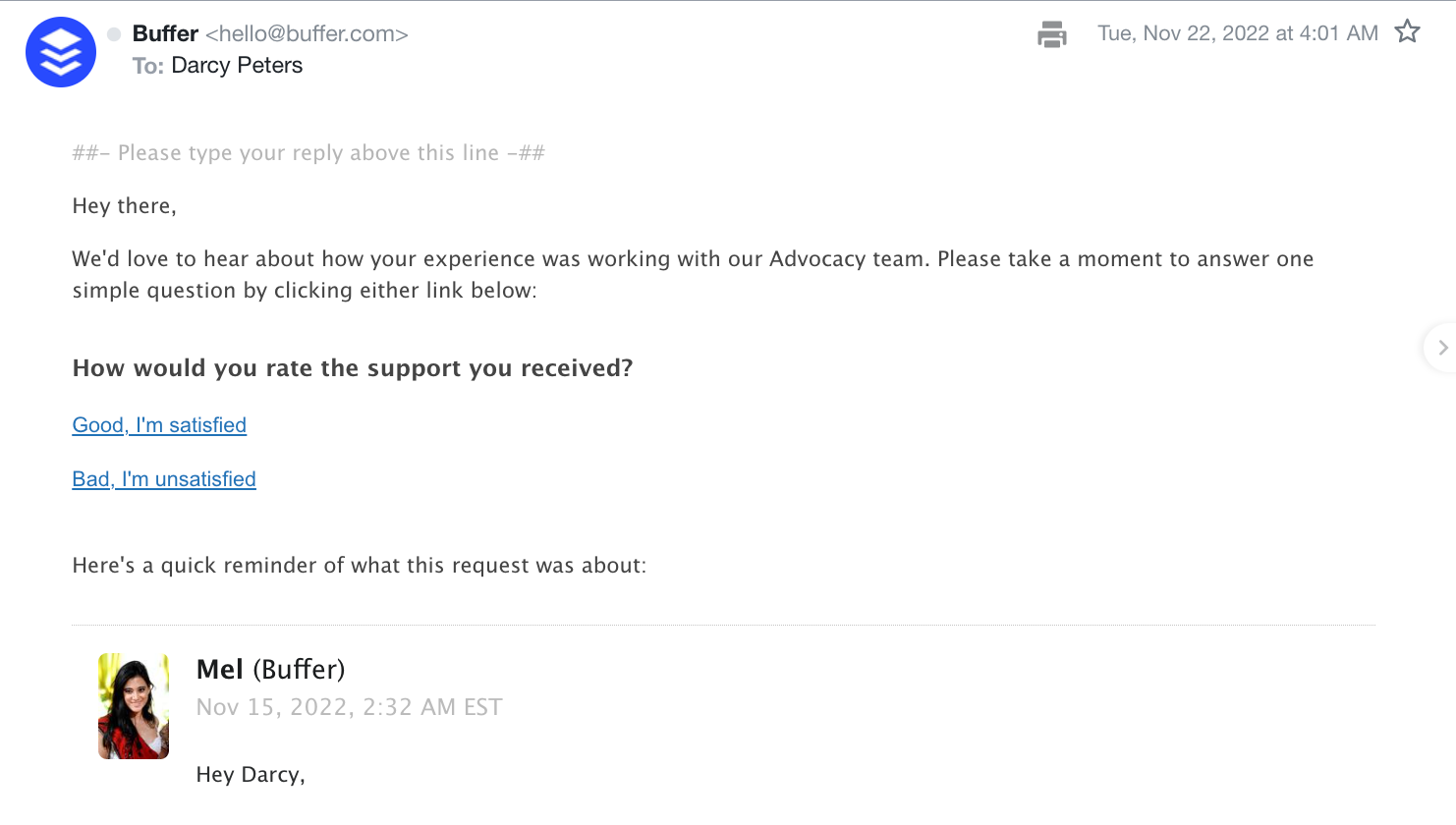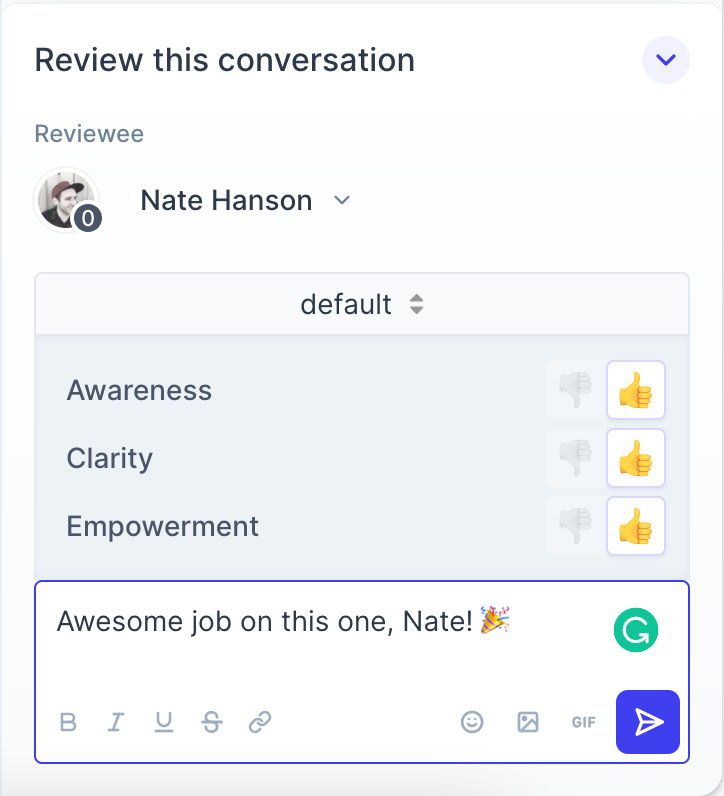[ad_1]
It’s fair to say that not many people grow up dreaming about working in customer support. It’s not the typical aspirational career path! Indeed, some see a customer support role as a stepping stone to something else or a short-term job in a break from college or Uni. After nearly a decade working in a support role here at Buffer, I’ve come to think of customer support as a career in its own right, and I’m more passionate about it than ever.
I’ve been working in the support team at Buffer for nine years, which is a significant and unusual amount of time in one job! In the tech world, people switch roles and employers more than in almost any other industry, making me even more of an outlier. There have certainly been times when the thought of moving on has popped into my mind, and I wondered if I should consider starting a new chapter. I want to share more about why I’ve stayed at Buffer and have no plans to leave.
First of all – why support?
I’ve always liked figuring things out, understanding how things work, making things better, and helping people. I feel satisfaction when I’ve been able to use my knowledge, experience, and skills to make a difference. I’ve previously worked in healthcare, where I made clinical diagnoses (focused on people) and in IT security roles (focused on tech). My customer support role at Buffer is in a sweet spot for me, where I use skills from both areas.
Working in customer support can draw on many skills you wouldn’t combine in other roles. In just one day’s work, you can use a wide range of skills: emotional intelligence, predictive communication, technical knowledge, troubleshooting/diagnostics, and testing. There’s also a lot of cross-team communication: we work directly with the finance team on sales admin, with the marketing team on launch planning, and we work with the product and engineering teams to support their work in improving our product and bringing new features to our customers. We’re far from being an isolated team!
Another awesome thing about support is that we need to know about the whole product, not just functionally. We need to know the ins and outs of how to use each feature, and we need to understand multiple use cases for each feature, the associated bugs, which bugs have recently been resolved for that feature, how features interact with one another, how our features differ from native features, etc. There’s the potential for infinite knowledge growth. You’ve never ‘arrived’ as a knowledge expert across the entire product due to continual changes, so there’s a constant challenge. However, amidst that challenge, your understanding of the resources which are at your disposal grows and gives you the confidence to continue navigating this ever-changing environment.
Second – why I’ve stayed at Buffer.
I joined in 2014 when we were still a start-up (Buffer was founded in 2012), and we were fewer than 20 people. The support team is currently bigger than Buffer was when I joined! I started out covering Saturdays and Sundays as a “Weekend Warrior” (we used to have slightly more jovial names for our roles, and we had a strong love of alliteration back then). I covered the email inbox and conversations coming in via social, and after a while, I transitioned into a more traditional work week.
Some people know Buffer as much for our culture as for our product. We’ve been fully remote since before my time, and being able to work from wherever you feel most productive has been incredibly powerful. To me, it’s the biggest perk!
I’ve been able to stay with my Dad, working from his place when he was unwell. I’ve also had the luxury of serving customers while poolside on a Spanish island. The flexibility and potential to find your best version of work-life balance without having to commute or being tied to an office is something I treasure. More recently, we transitioned to a four-day work week without a drop in salary. You might be starting to understand why Buffer is an exceptional company! Beyond these things, we’re a values-led company, and despite being spread around the globe, there are key things we all have in common.
The work we do in support has always been focused on empowering people. We want to be there to help, but we also want to get out of the way as soon as possible. There are a few ways we do this:
- We offer the same level of support to our Free plan users as any paying customer, which means we can be there for people just getting started. That’s incredibly powerful.

- We invite customers to review their support experience, and we pay very close attention to how they score us. Our customer satisfaction score is currently 97%!

- We use a system to review and rate our support conversations and make sure we’re delivering a really high standard, focusing on three tenets: Awareness, Clarity, and Empowerment.

Over the span of 9 years, Buffer has changed a lot. Our product is more powerful and more complex, and our company has grown to just under 80 people. All this change has kept my role interesting, with fresh challenges and shifting team structures as we’ve evolved and refined our work and experimented with new approaches and tools. At the same time, we’ve maintained our small team mindset and focused on our core values.
In the last year, I’ve taken on a Product Liaison role (more on that here), working as a link between our support team and our fantastic product team. I’ve learned so much! I make sure that the support team knows about all the customer-facing changes being worked on, as well as pass on customer insights that come through the inbox – such as areas of product friction and feature requests. I’m also getting more involved in pre-release testing and learning about the whole process of bringing new features to market. It’s been eye-opening, and the last 12 months have been the most exciting and rewarding of my career.
How I avoid stalling and keep my motivation fresh
Once or twice a year, I’ve intentionally stepped back from my work to reflect and ensure I’ve not gotten stuck in a rut or complacent about what I do. I’d never want to work on autopilot; that just isn’t me. Luckily, my work keeps me on my toes! There are also some proactive things I’ve done, that have greatly enriched my work and career in support:
- Take time to connect with the broader support community. There are Slack communities and real-life opportunities, such as meet-ups and conferences. Building a network of support professionals outside of Buffer’s customer Advocacy team worked well for me. It started out very organically, at a Customer Support meet-up one evening in London. I was chatting with some lovely people who also worked remotely about how nice it might be to co-work regularly. This was the start of the Support Breakfast, an informal co-working event based around breakfast in various venues in London. We worked from all kinds of locations, including coffee shops, hotel lobbies, and museums, and formed close friendships over time. We had such great chats about the common themes in our work and the different ways that we approached some of the challenges we faced, that we started recording our conversations and sharing them as a podcast.
- Be aware of working on autopilot. I’m not thinking of ‘getting in the zone’ here, more about coasting through the day. I’ve had jobs like that in the past, and it’s just not me. I don’t think that most people want that from a career. Some level of challenge that you can feel good about at the end of the day or week.
- Review available roles at other companies from time to time. The role description and requirements can help frame your current role and inspire you in terms of personal growth and the skills you want to develop. Not only will this enrich your current work, but it will also ensure that you’re market-ready if you decide to move on.
- Take on new challenges and projects within your capacity and with your manager’s support. Find areas within your team or adjacent teams where you can help out. For a while, I was wary that as Buffer had grown, our roles became more defined, with less variety in our work or opportunities to do something different. In small companies, you often do what needs doing, whether in your job description or not – in larger organizations, your role is more clearly mapped out and defined, and there are fewer opportunities to ‘wear many hats’. However, even in larger organizations, there are always going to be gaps that need filling, new initiatives or experiments that are worth exploring, or people or teams that need help.
- Finally, I recommend reading books and articles and listening to podcasts to expand your knowledge. Customer support has really been coming into its own as a career, and like all careers, there are emerging trends and opportunities.
I ended up working in the support world because I like to help, and I’ve ended up surrounded by some of the kindest and most supportive people I’ve ever met.
There are many directions that a career in support can take you and so many areas that you can get a taste of and perhaps go on to specialize in: marketing, customer research, community management, sales, and account management. You can go deeper into technical skills and engineering, as well as progress into an operations or leadership role. I didn’t grow up expecting to follow this path, but I’m fueled and encouraged by how dynamic and fulfilling my career in customer support has been. I’ll be here for a while!
What thoughts come to mind for you on this topic? Come chat with me over on Mastodon, Twitter, or LinkedIn!
[ad_2]
Source link









![Can You Create a Wikipedia Page for Your Company? [Best Practices & Guidelines to Know] Can You Create a Wikipedia Page for Your Company? [Best Practices & Guidelines to Know]](https://i0.wp.com/imtools.pro/wp-content/uploads/2023/11/how-to-create-a-wikipedia-page.pngkeepProtocol.png?resize=150%2C150&ssl=1)
![How to Write a LinkedIn Recommendation in 2023 [Quick Tip + Examples] How to Write a LinkedIn Recommendation in 2023 [Quick Tip + Examples]](https://i0.wp.com/imtools.pro/wp-content/uploads/2023/11/write-linkedin-recommendation.pngkeepProtocol.png?resize=150%2C150&ssl=1)